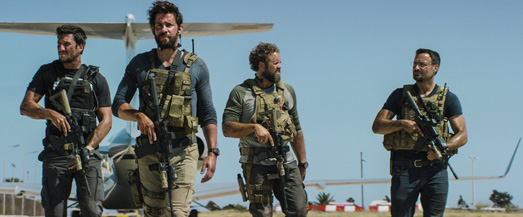Movie Review - 13 Hours: The Secret Soldiers of Benghazi
By Ben Gruchow
January 25, 2016
There are isolated moments after this that contain the same dreadful power, where 13 Hours begins to cross a phantom line between expert simulation of violent chaotic tension into the real thing. These moments are without exception the quieter ones, where the filmmakers forgo the conscious effort to amp up the intensity and let the horrific nature of the events themselves dictate tone. There are also moments where the characters breathe a little bit more, and a late exchange between contractors Jack Silva (John Krasinski) and Tyrone Woods (James Badge Dale), where the movie threatens to come together over the concept of danger and violence as addictive to the participants in equal or similar measure to their desire to be safe with their families.
Had the movie held onto that thought, it would've been a case of “too little, too late”, but it'd have been something. Soon enough, though, we're back to extended volleys of gunfire and mortar rounds, all filmed with an eye toward maximum disorientation. The movie severely backloads all of its most potent material, and by the time we start getting to moments that might carry weight on their own terms, we've been hammered by 110 minutes of slick, loud technique and sloppy filmmaking posing as raw and unfiltered storytelling (in its most sedate moments, the movie still falls victim to Bay's “cut to this angle, and then this angle, and then this angle” aesthetic).
I get the feeling that Bay was going for sensory overload in the audience members, to the point where intensity crosses a fragile line and everything on-screen becomes too much; to the extent that he wanted to depict how unpredictable and asynchronous and claustrophobic that night in Benghazi must have been, it's not a dishonorable goal. This should not be fun to watch, and it isn't. But there are multiple ways to induce that feeling of helplessness and numbness in the audience, and the way taken by 13 Hours is the way that happens to be the easiest and the least effective in the long term: by simple audiovisual bludgeoning.
The movie is loud, it's bloody, and it's grim. But it's all of these things in a profoundly commercial and staged way. Every shot, even the most hectic, manages to be precisely lit with the “right” contrasts of blue and green and yellow and orange, and the dirt and blood on cast members never sells itself as anything beyond expertly-applied makeup. The “raw” video aesthetics are regularly betrayed by elaborate aerial craning, dollying, and tracking camera moves. Let's ignore the slick technique, then; the movie rests much of its conflict and suspense on an assertion (regarding a potentially quicker response time to the initial attack) that is supported largely on circumstantial evidence or even outright falsehood.
The moment we consider the likelihood that the immediate response to the Benghazi events was a humane one, born from military protocol, practiced caution, and an imperative not to incur greater risk to a larger number of people (as opposed to academic disregard or cowardice, which is what 13 Hours very strongly implies), any larger point here sort of winks out. We are left then with two hours of manufactured action, suspicion, and (at the end) cynicism, with a movie that can't support any of those feelings with much substance. It is an unpleasant time at the theater, and not for the right reasons.
Continued:
1
2
|
|
|
|




